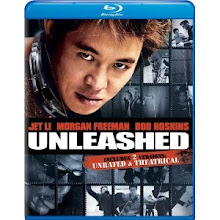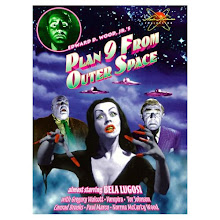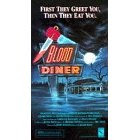Sunday, October 31, 2010
"Battle Royale" comments by Andy
The essence of the film is that, at the turn of the century, Japan's economy collapses and employment skyrockets. Children become disillusioned with adults and start openly rebelling against teachers, police, parents, etc. The Government then creates and passes a law, commonly known as "BR." What the act provides for is that classes of 8th or 9th graders (I can't remember...) are taken to an island to fight to the death. And that's what happens in our film. It's "Lord of the Flies" meets "The Most Dangerous Game," meets "Pokemon."
A class boards a bus for a field trip, and after being drugged unconscious, arrives at an island. They realize that around their necks are metal collars with some sort of electronic device. They are greeted by a small group of armed infantry, and, to their unfortunate surprise, their teacher from the previous year. After reminding the class of how terrible they were to him, the teacher explains the situation. The kids are stuck on an island for the next three days. Only one kids will leave the island at the end of the contest, provided only that all the other kids are dead. If more than one kid is alive at the close of the contest, the collars will explode and kill all the kids. Any misdeed, tampering, etc., will cause the collar to explode. Each kid is issued a satchel with some provisions and a "weapon." I say "weapon" because the "weapon" each kid is issued is different. Some are issued a firearm, another a bow and arrow, the next a knife, and others were issued binoculars, and one kid got a gps unit.
Let the killing begin. There is a tender love story contained within the violence, but most of it is overshadowed with death and dismemberment. And it is very bloody. It's a slasher film at it's core, and I think it does an effective job at scaring the bejebbies out of you and providing realistic, yet stylized violence. Quentin Tarantino likes the film, to give you an idea. Very well done, very violent, very "not suitable for children."
Friday, October 29, 2010
Bonus Podcast With Directors of Cleanflix

Considering the Sequels is a monthly film podcast that examines the merits and weaknesses of specific movie franchises.
But this BONUS episode varies from our usual format and gives us the opportunity to discuss the new documentary, “Cleanflix,” with its directors, Andrew James and Josh Ligairi.
Your hosts are Andy Howell, Karl Huddleston and Jason Pyles. Download this episode to find out how you can win a free copy of Roger Ebert’s Movie Yearbook 2009.
Listen to the podcast here: http://bit.ly/cQkcpv
Read my written movie review of "Cleanflix" here: http://bit.ly/aS8IMr
Monday, October 25, 2010
New Podcast Episode Posted: Wall Street
 Featuring special guest Rob Booker, currency trading money manager, registered commodities trading adviser
Featuring special guest Rob Booker, currency trading money manager, registered commodities trading adviserTuesday, October 5, 2010
Adjective + “Porn” Suffix Is a Misnomer, Usually
by Jason Pyles
In Episode 4 of the Considering the Sequels podcast, we discussed modern film criticism with film critic Missy Thompson. At about the 25-minute mark, we talked about how innovative trailblazing is still possible in such an art as young as film criticism. We noted, as an example, the designation of the term “mumblecore” to describe the American independent film movement characterized by low-budget production values, generously improvisational scripts, naturalistic acting, lighting, etc. That term isn’t overly self-evident, but it does the job.
However, in our zeal to describe the cinema, we film writers sometimes settle upon coined terms that are incorrect, such as adding the pseudo-suffix “porn” to an adjective to describe a genre or sub-genre. As far as I know, this began with the phrase “torture porn,” which is most commonly meant to describe a film that’s replete with graphic torture scenes. Usually the usage of “torture porn” has nothing to do with explicit depictions of sexual behavior or organs. In this sense, the pseudo-suffix “porn” is intended to convey a gratuitous, graphic abundance of whatever adjective precedes it.
Another example I’ve heard is “disaster porn.” I’ve heard this used more than once to describe Roland Emmerich’s “2012,” for instance.
But as I’ve suggested above, there’s a problem. This practice is technically incorrect and should therefore be scrubbed from usage. It is incorrect because the official definition of the word “pornography” has a sexual affiliation. Here is the definition my iMac, desktop dictionary gives for pornography:
“Printed or visual material containing the explicit description or display of sexual organs or activity, intended to stimulate erotic rather than aesthetic or emotional feelings.”
Ergo, “porn” is not a suitable synonym to be substituted for the phrase “gratuitous, graphic abundance.” No, the words “porn” or “pornography” are rooted in sexually explicit material.
Now, unfortunately, there are instances (so I’ve heard) where “torture porn” is exactly the correct phrase because it describes explicit sexual depictions — in conjunction with — physical torture. In this case, the phrase is acceptable, even though its manifestation isn’t.
So, in the spirit of advancing film criticism, what do I suggest to replace this imprecise phrase? I don’t know ... but what’s wrong with “torture flick” or “disaster flick”? It has always worked fine for “porno flick” or “chick flick."
Oct. 6 Addendum: It has been brought to my attention by The /Filmcast, as I feared it might, that there are some dictionaries that define pornography in the sense that I'm complaining about above (though, my up-to-date dictionaries do not), which would suggest a fatal blow to my argument. However, I still stand by my assertion that this usage is problematic, and therefore unusable, purely for its ambiguity: Pornography is universally understood to be sexual in nature. So, while I guess I can concede that there are flimsy grounds for this sort of usage, my personal, future film writing will not contain this phrase. Note: My exception found here was purposely intended as a segue to this article.
Sunday, October 3, 2010
Jason's Movie Reviews
Friday, October 1, 2010
Listen to Episode 4 of our Sequels Podcast
 In Episode 4 we consider the “Alien” franchise. This episode also includes a concept discussion in which we talk about the role and value of modern film criticism. And, as always, we each give mini reviews of recent film releases and whatever else we’ve been watching lately.
In Episode 4 we consider the “Alien” franchise. This episode also includes a concept discussion in which we talk about the role and value of modern film criticism. And, as always, we each give mini reviews of recent film releases and whatever else we’ve been watching lately.




























































